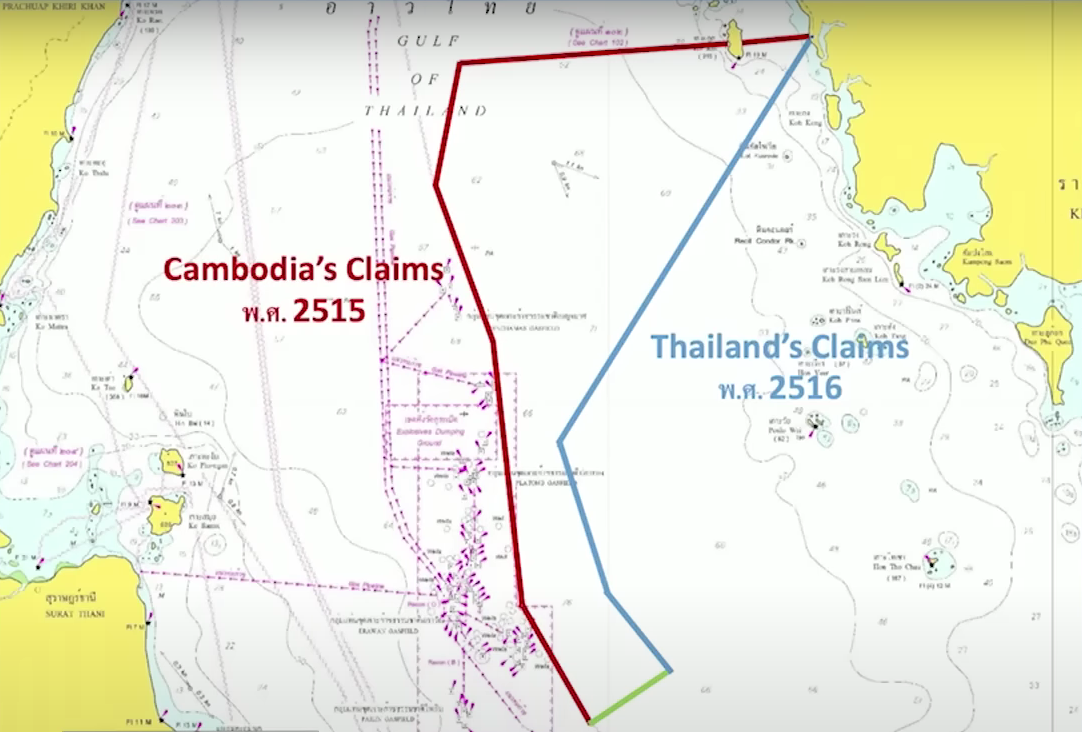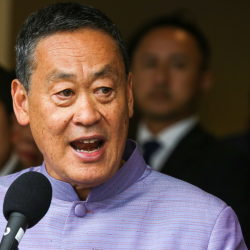Thai government tweaks strategy for joint extraction of petroleum resources with Cambodia

The government under Prime Minister Srettha Thavisin has proposed an adjustment to the negotiation strategy with Cambodia on the overlapping claims areas (OCA) in the Gulf of Thailand, according to government officials.
The tweaking of the framework of the Thailand-Cambodia 2001 Memorandum of Understanding (MoU) aims to speed up talks to reach an agreement on joint extraction of petroleum resources
Deputy Prime Minister and Energy Minister Pirapan Salirathavibhaga said his government would refocus the negotiation with Cambodia on the OCA, emphasizing joint development rather than delimitation of the territorial sea.
“We need energy from the OCA, not the delimitation of the territorial sea. It’s difficult and takes time to settle disputes over territory since no country can easily accept the change in its boundaries,” he said.
Thailand and Cambodia have claimed their respective continental shelves and territorial seas at different times and the claims were based on different laws. “Both countries have legitimate claims, so it’s hard to judge who is right or wrong,” said Pirapan, a legal expert. “If we cannot settle the dispute easily, what is the point in making it more complicated by linking the two issues together,” he said.
The MoU, jointly signed by the former Thai foreign minister Surakiart Sathirathai and the late chairman of Cambodian National Petroleum Authority, Sok An, on June 18, 2001, in Phnom Penh made clear that negotiations on delimiting territorial borders in the sea and the joint development of petroleum resources must be done simultaneously as an indivisible package.
A long history
The overlapping claims area of 26,000 square kilometers is situated in the Gulf of Thailand, which potentially contains up to 11 trillion cubic feet of natural gas as well as large quantities of condensate and oil. It was delineated in the west when Cambodia claimed its territorial sea in 1972 and in the east as Thailand counter-claimed in 1973.
The two countries have tried to settle the dispute peacefully since the 1990s but failed to make any progress until the beginning of the 21st century. The Thai government under Thaksin Shinawatra and Cambodia under Hun Sen reached the 2001 MoU to determine areas above 11 degrees North latitude for delimitation and below that line for joint development.
The MoU also established the Joint Technical Committee (JTC) and sub-committees as mechanisms for negotiation to settle boundary disputes as well as jointly exploit natural resources.
The document was at risk of being scrapped in 2009 when the Thai Cabinet under Prime Minister Abhisit Vejjajiva voted to reject the 2001 MoU after a flare-up between the two countries over land boundary disputes notably at the Hindu temple of Preah Vihear. Abhisit was upset as the appointment of Thaksin as Hun Sen’s advisor could possibly cause a conflict of interest given that the document was signed during Thaksin’s government.
However, the MoU survived as Yingluck Shinawatra’s administration dismissed the previous resolution and reaffirmed that it was a fundamental document for the OCA. The relations with Cambodia were then normalized but Yingluck’s government failed to achieve any progress on the matter as it got bogged down in domestic issues.
The government of General Prayut Chan-o-cha, who ousted Yingluck in the 2014 coup, achieved no breakthroughs during nine years in power. The military-backed government simply set up a joint technical committee chaired by the then deputy prime minister Prawit Wongsuwan in late 2022. Prawit later set up two working groups under his committee but had no chance to resume negotiations with his Cambodian counterparts as his government was ousted in the May 14 election this year.
Differences within the government
Deputy Prime Minister and Foreign Minister Parnpree Bahiddha-Nukara said after a visit to Phnom Penh in late September that his government needed to set up a new joint technical committee before resuming the OCA negotiation with Cambodia.
It remained unknown who would be included in the committee and whether it would be led by the Foreign or Energy ministries. Pirapan, who is the leader of the United Thai Nation Party, likely wanted to take the job. He proposed separating the energy issue from the sea border negotiation. The private sector, which is keen on energy, should significantly participate in the negotiations, he said.
“The Foreign Ministry has nothing to do with the energy matter,” he said, and added that the negotiations would never succeed if the energy and territory matters were tied together.
Pichai Naripthapan, an advisor to the prime minister and a key member of the ruling Pheu Thai Party, said the negotiations should focus on the energy matter and a joint development scheme. Energy is an urgent issue as the people are shouldering a heavy burden of high costs, said Pichai, a former energy minister.
Even if both countries reach an agreement on the OCA today, it would take at least eight years to extract natural gas for consumption, he said.
The latest conversation between Cambodia’s Mine and Energy Minister Keo Rattanak and Thailand’s Ambassador to Phnom Penh Cherdkiat Atthakorn in late September, shortly before the visit of Prime Minister Srettha to Cambodia likely focused on cooperation on energy and petroleum.
By Thai PBS World’s Political Desk






